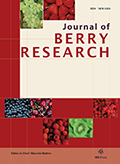Authors: Kunrade, Līga | Rembergs, Reinis | Jēkabsons, Kaspars | Kļaviņš, Linards | Kļaviņš, Māris | Muceniece, Ruta | Riekstiņa, Una
Article Type:
Research Article
Abstract:
BACKGROUND: Berry processing residues called pomaces are rich in polyphenols, sugars, organic acids, and minerals. Polyphenols are reported to reduce the risk of non-communicable diseases, including cardiovascular diseases, cancer, and diabetes mellitus, owing to their anti-inflammatory activity. OBJECTIVE: We aimed to assess the anti-inflammatory properties of five Vaccinium spp . berry pomace extracts using LPS-stimulated THP-1 monocytes and a COX-2 inhibition assay. METHODS: THP-1 monocytes were pre-incubated with chemically characterized bilberry, blueberry, American cranberry, bog cranberry, and lingonberry pomace extracts following LPS stimulation. NF-κ B nuclear translocation was assessed by flow cytometry. TNF-α , MMP-9, IL-23,
…IL-10, IL-1β , CCL22, and IL-8 secretion was analyzed in cell culture supernatant by using Luminex assay and ELISA. The expression of IL-6 , TNF- α , IL-10, IL-23 , and TGF- β 1 was assessed by qPCR, and COX-2 activity was determined by a fluorometric inhibition assay. RESULTS: All berry pomace extracts tested, except for lingonberry, inhibited LPS-induced NF-κ B nuclear translocation. All five extracts significantly downregulated the expression of pro-inflammatory cytokines and inhibited COX-2 activity in vitro . CONCLUSIONS: Vaccinium spp . pomace extracts demonstrated anti-inflammatory properties in an LPS-stimulated THP-1 cell inflammation model and inhibited COX-2 activity. Thus, Vaccinium spp. berry pomace extracts could serve as a valuable source of anti-inflammatory compounds.
Show more
Keywords: Bilberry, blueberry, cranberry, COX-2, lingonberry, NF-κB, pomace extracts, pro-inflammatory cytokines, THP-1 monocytes
DOI: 10.3233/JBR-190485
Citation: Journal of Berry Research,
vol. 10, no. 3, pp. 381-396, 2020





